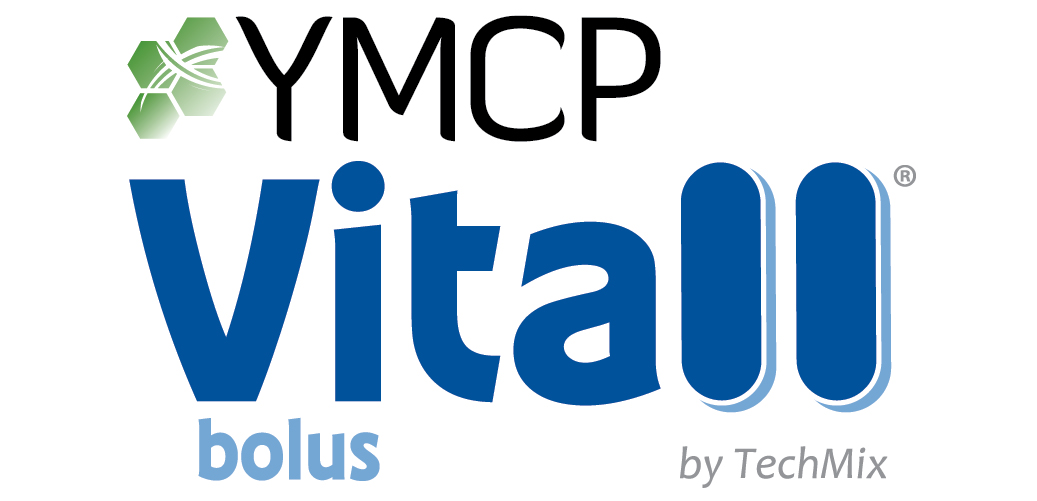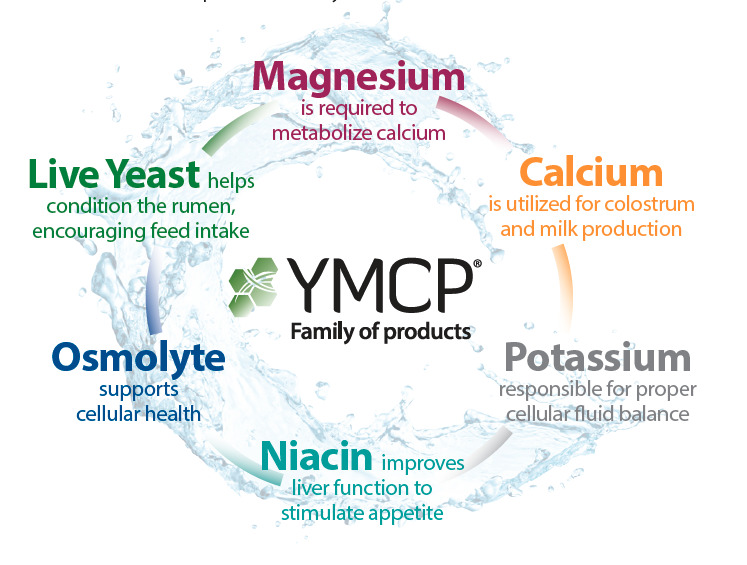Immunity:
Reinforces gut barrier integrity reducing inflammation and more productive utilization of nutrients.
Connecting the Immune System with Nutrition
Most health problems dairy cows encounter occur around freshening and relate to the challenges of adapting to the new diet and nutritional needs for lactation. Inadequate nutrient intake, such as during reduced dry matter intake (DMI), can create a nutritional imbalance leading to decreased immune function and can become a contributing factor to several metabolic diseases common in dairy cattle including mastitis, retained placenta, metritis, displaced abomasum, and ketosis. Certain nutrients and metabolites, such as glucose, can influence important aspects of immune response and potentially disease resistance. Therefore, establishing and maintaining DMI and providing key nutrients necessary for immune function is top priority.
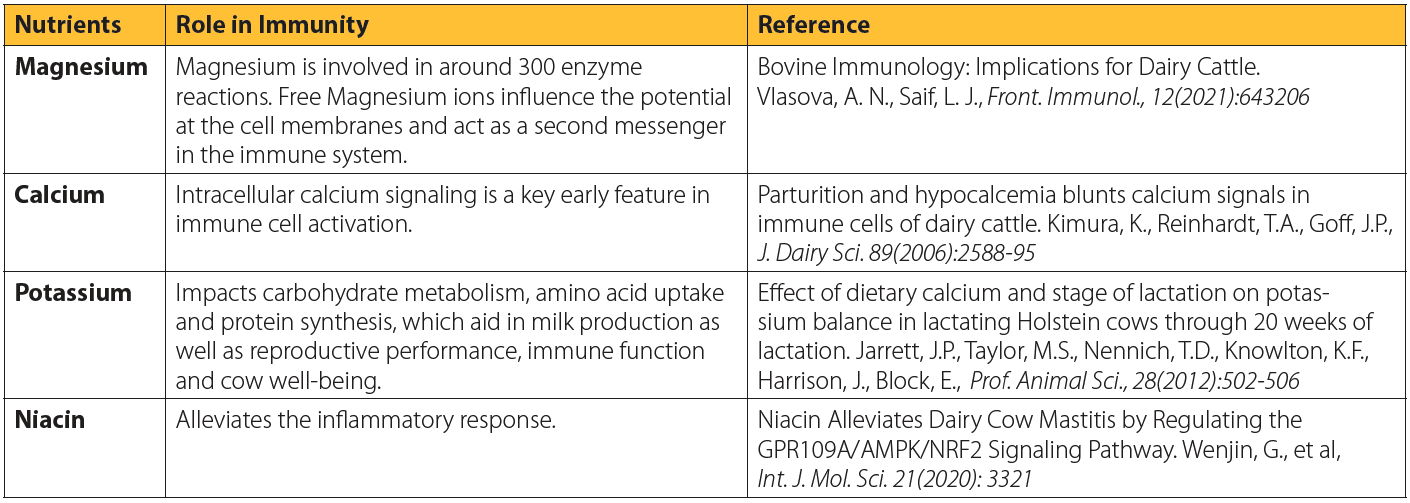
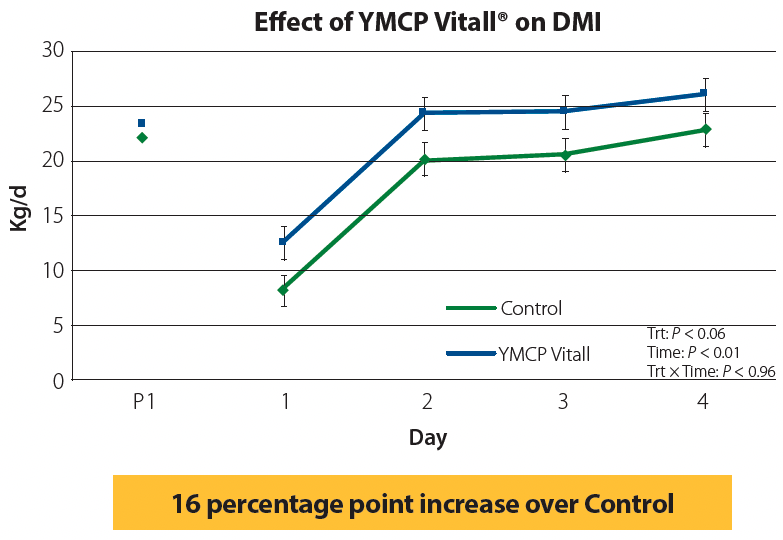
Lipopolysaccharide (LPS) challenge trial
In a recent trial (M. Al-Qaisi et al, 2020), supplementation of YMCP Vitall® around the time of elevated levels of LPS markedly ameliorated hypocalcemia. Both Control and YMCP Vitall groups showed similar initial response to LPS challenges. This included increased body temperature and respiration rate and decreased circulating blood glucose between 3 and 12 h post LPS-infusion. LPS markedly decreased DMI (60%; P < 0.01) similarly for both treatments on d 1. However, for YMCP Vitall supplemented cows, DMI was improved 16% (P = 0.06) compared to control cows that were subject to the same LPS challenge. Overall (d1-4) DMI tended to be reduced less (14 vs 30%; P = 0.06) in YMCP Vitall supplemented vs Control cows, representing 22% increased DMI.
Immune challenged cows require more glucose
Efficient glucose uptake by immune cells is critical for maintaining cellular functions and eliciting an optimal host response to invading microorganisms. Glucose is required by phagocytic cells for proliferation, survival and differentiation, and glucose has been shown to be the preferred metabolic fuel during inflammation for activated polymorphonuclear neutrophils, macrophages and lymphocytes rather than fatty acids, amino acids or ketones.
Calcium and immune support
In peripheral blood mononuclear cells (PBMC), stores of calcium decrease prior to parturition and the development of hypocalcemia. This suggests that systemic calcium stress precedes measurable hypocalcemia, particularly in cows that will develop milk fever. Therefore, PBMC intracellular calcium stores are a sensitive measure of calcium stresses in transition cows.
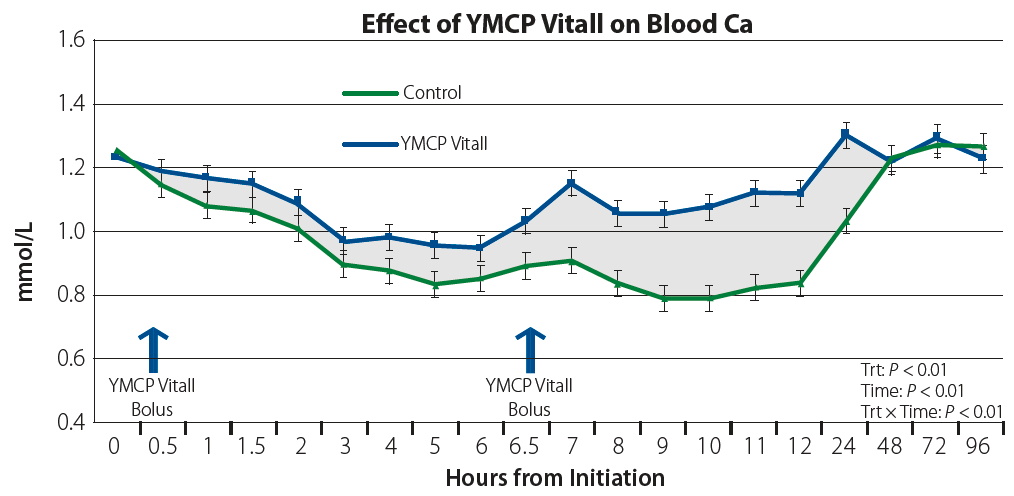
This decrease in PBMC intracellular calcium stores before parturition along with the development of hypocalcemia, contributes to periparturient immune suppression. Results from the aforementioned LPS challenge trial, show that supplementation with YMCP Vitall elevated blood calcium levels—a boost that could support the challenged cow’s immune function.
Benefits from getting fresh cows on feed sooner
Cows on feed sooner will have less GI immune activation/ leaky gut.*
• Less LPS infiltration – Fewer sick cows – Fewer under performing cows
• Less nutrient partitioning to support immune system
Elevated blood Calcium can support immune function.**
- Supports immune-responsive cells
- Reduces risk of metabolic challenges
More energy and nutrients utilized in early milk synthesis and in early ramp up of milk production.***
- Faster return to positive energy balance
Vlasova, A. N., Saif, L. J., Front. Immunol., 12(2021):643206
Kimura, K., Reinhardt, T.A., Goff, J.P., J. Dairy Sci. 89(2006):2588-95
Wenjin, G., et al, Int. J. Mol. Sci. 21(2020): 3321
* Horst, E.A., J. Dairy Sci.,103 (2020):7472–7486
**Al-Qaisi, M., et al., Res. Vet. Sci., 129 (2020), pp. 74-81
*** Bach, A., et al., IRTA Spain, 2007 Anim. Feed Sci. 146-153
*** Perdomo, M.C., et al., J. Dairy Sci. 103 (2019):325-339
*** Guedes, C.M., et al., CECAV Portugal, 2008. Anim Feed Sci Technol 145:27-40



